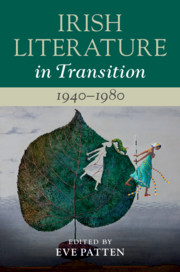Book contents
- Irish Literature in Transition, 1940–1980
- Irish Literature in Transition
- Irish Literature in Transition, 1940–1980
- Copyright page
- Contents
- Contributors
- Series Preface
- General Acknowledgements
- Introduction
- Part I After the War: Ideologies in Transition
- Part II Genres in Transition
- Part III Sex, Politics and Literary Protest
- Part IV Identities and Connections
- Chapter 13 State, Space and Experiment in Irish-Language Prose Writing
- Chapter 14 Anglo-Ireland: the Big House Novel in Transition
- Chapter 15 American–Irish Literary Relations
- Chapter 16 ‘Home Rule in Our Literature’: Irish–British Poetic Relations
- Part V Retrospective Frameworks: Criticism in Transition
- Index
Chapter 16 - ‘Home Rule in Our Literature’: Irish–British Poetic Relations
from Part IV - Identities and Connections
Published online by Cambridge University Press: 28 February 2020
- Irish Literature in Transition, 1940–1980
- Irish Literature in Transition
- Irish Literature in Transition, 1940–1980
- Copyright page
- Contents
- Contributors
- Series Preface
- General Acknowledgements
- Introduction
- Part I After the War: Ideologies in Transition
- Part II Genres in Transition
- Part III Sex, Politics and Literary Protest
- Part IV Identities and Connections
- Chapter 13 State, Space and Experiment in Irish-Language Prose Writing
- Chapter 14 Anglo-Ireland: the Big House Novel in Transition
- Chapter 15 American–Irish Literary Relations
- Chapter 16 ‘Home Rule in Our Literature’: Irish–British Poetic Relations
- Part V Retrospective Frameworks: Criticism in Transition
- Index
Summary
One of the most significant components of a formative modern Irish literary canon in the middle decades of the twentieth century is its interaction with a neighbouring British literary tradition. In its emphasis on this mid-century hinterland the chapter seeks to revise existing concepts of ‘resurgence’ in the Irish poetry of the 1970s, and explores instead the aesthetic inheritances, connections and continuities that define this period. It initially discusses how members of the poetic coterie in 1940s Dublin, Austin Clarke and Valentin Iremonger, responded in different ways to the publication of Freda Naughton’s A Transitory House by Jonathan Cape in 1945. In being dismissed or praised for its detachment from Ireland, this – her first and only volume - offered a sounding board for anxieties about these writers’ status in relation to England. A similar kind of anxiety is found in the Ulster poetry and criticism of John Hewitt, Roy McFadden and particularly Robert Graecen during these years, writers who held an awkward position in relation to both British and Irish traditions. It then tracks a series of engagements through the 1950s, when Philip Larkin was in Belfast and Donald Davie was in Dublin, locations which were far more productive for the latter than the former.
Keywords
- Type
- Chapter
- Information
- Irish Literature in Transition, 1940–1980 , pp. 288 - 306Publisher: Cambridge University PressPrint publication year: 2020

